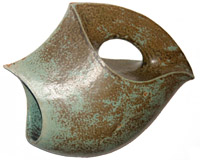Artist’s
Statement
If
it were evolutionarily advantageous for an organism to be a pitcher,
into what
form would it evolve? This
is one of
the ways I approach the design of my work.
Just as in nature, the solution to such a problem is in
some ways
complex and in other ways elegantly simple.
Simple rules create complex forms, but the coherence and
simplicity is
still apparent.
To
achieve this coherence I devote many hours to finding internal
relationships
between elements of the form and determining what the evolutionary
‘selective
pressures’ are. I
consider all the
aspects of the pot, many of which are part of the user's perception but
not
necessarily their conscious perception.
All edges and surfaces are in a coherent relationship, so
that any way
you look at it (or feel it), it adds up.
Every curve, profile, shadow, reflection, negative space,
partial view,
angle of view, looks and feels necessary and natural.
There are no bad sides, there is no want or thought for
change.
Beyond
my intrinsic aesthetic and my understanding of natural patterns, the
culture
and technology of the present influence my designs.
Throughout history, functional vessels have repeatedly
developed
from very simple into more complex, formal, technologically
sophisticated, and
specialized forms we use today.
I
consider the designing of each form to be my continuation of this
history.
Much of the power of my forms comes
from the feelings
elicited by strong, direct stimulation of the pattern recognition
systems of
the visual cortex. This
is analogous to
the feeling that comes from the recognition by the auditory cortex of a
well-structured waveform, a musical tone.
Sometimes, in my simplest forms, this is the dominant
effect.

Throughout my process, I attempt to decipher what the forms will evoke in others and myself, steering away from unequivocal and unpleasant connections, towards open-ended and positive evocations. My Pitcher #1 (pictured at left) might be a porcelain relative of a bird on a wire, a speedboat, or something else graceful and fast.
Just
as I
spare no time in finishing a work, I spare nothing to refine my
materials and
processes for maximum visual effect and tactile comfort. I devise a fabrication
process that will
allow me to make the form I imagine, instead of letting the standard
fabrication processes determine what I can make.
This has led to very specialized processes in the
traditional
techniques of slipcasting, wheelthrowing, and handbuilding, as well as
novel
glaze application and firing processes.
I work with porcelain for its durability and luminosity,
and I formulate
simple
pure-color transparent or translucent glazes
that emphasize rather than distract from the forms.
This style of glaze led to my original use of lanthanide
elements
for new transparent glaze colors.
The resulting pots, carefully considered in every respect, just in all proportions, expertly proficient in their function, should be relaxing, reinvigorating, and reassuring in their exactitude, a pleasant relief from the discomforts and chaos of daily life.
-David Pier, November, 2005

An extinct pot from my Graduate School era.
Some elements from these early experiments
in evolution survive today
in pitcher and cup descendents.
.
.
.
.
.